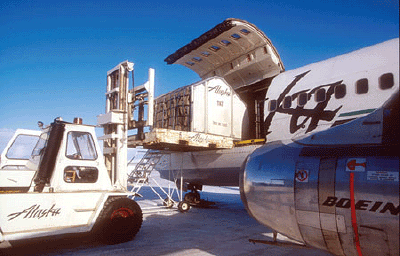Fri, Nov 12, 2004
Establishes "All Cargo" Program
 NATA Thursday praised the TSA for
its efforts with the recent release of proposed rulemaking to
enhance security for air cargo operations.
NATA Thursday praised the TSA for
its efforts with the recent release of proposed rulemaking to
enhance security for air cargo operations.
On Wednesday, November 10th, the TSA published a Notice of
Proposed Rulemaking (NPRM) seeking to enhance the security of cargo
transported on passenger and all-cargo aircraft. The NPRM would
establish a new type of "all-cargo" program for aircraft weighing
more than 45,500 kg. The proposed rule also calls for new security
measures for cargo carried on passenger aircraft.
Any all-cargo aircraft weighing more than 12,500 pounds and up
to 45,500 kg are currently regulated under the Twelve Five Standard
Security Program (TFSSP) and would remain so regulated under the
proposed rule. Most all-cargo aircraft currently subject to the
TFSSP are Part 135 on-demand air carriers.
NATA is an active member of the Aviation Security Advisory
Committee (ASAC) whose recommendations formed the basis for most of
the NPRM. "Throughout the ASAC deliberations, NATA advocated on
behalf of the small Part 135 carriers to ensure that the unique and
diverse nature of their operations was recognized by the TSA," NATA
President James K. Coyne explained. "We are pleased that the TSA
has taken our concerns to heart by publishing a balanced approach
to enhancing air cargo security.

"NATA supports the TSA's decision to retain smaller all-cargo
aircraft under the Twelve Five Standard Security Program," Coyne
explained. "We believe that the TFSSP provides an appropriate level
of cargo security for the aircraft that participate in the program
while recognizing their smaller size and operational environment
that clearly have a different security risk profile than that of
the large aircraft cargo haulers.
"NATA is pleased that the TSA has recognized that a
one-size-fits-all approach to security is neither effective nor
necessary. While we expect our comprehensive analysis of the NPRM
to generate association recommendations for change, overall we
believe this proposal takes the air cargo community in the right
direction," Coyne concluded.
More News
Aero Linx: Model Aeronautical Association of Australia MAAA clubs are about fun flying, camaraderie and community. For over 75 years, the MAAA has been Australia’s largest fl>[...]
Touchdown Zone Lighting Two rows of transverse light bars located symmetrically about the runway centerline normally at 100 foot intervals. The basic system extends 3,000 feet alon>[...]
“Discovery and innovation are central to our mission at Virgin Galactic. We’re excited to build on our successful record of facilitating scientific experiments in subor>[...]
How To Get A Story On Aero-TV News/Feature Programming How do I submit a story idea or lead to Aero-TV? If you would like to submit a story idea or lead, please contact Jim Campbel>[...]
Student Pilot Reported That During Rotation, “All Of A Sudden The Back Of The Plane Kicked To The Right..." Analysis: The student pilot reported that during rotation, “>[...]
 ANN's Daily Aero-Linx (05.02.24)
ANN's Daily Aero-Linx (05.02.24) ANN's Daily Aero-Term (05.02.24): Touchdown Zone Lighting
ANN's Daily Aero-Term (05.02.24): Touchdown Zone Lighting Aero-News: Quote of the Day (05.02.24)
Aero-News: Quote of the Day (05.02.24) ANN FAQ: Contributing To Aero-TV
ANN FAQ: Contributing To Aero-TV NTSB Final Report: Cirrus Design Corp SR20
NTSB Final Report: Cirrus Design Corp SR20




